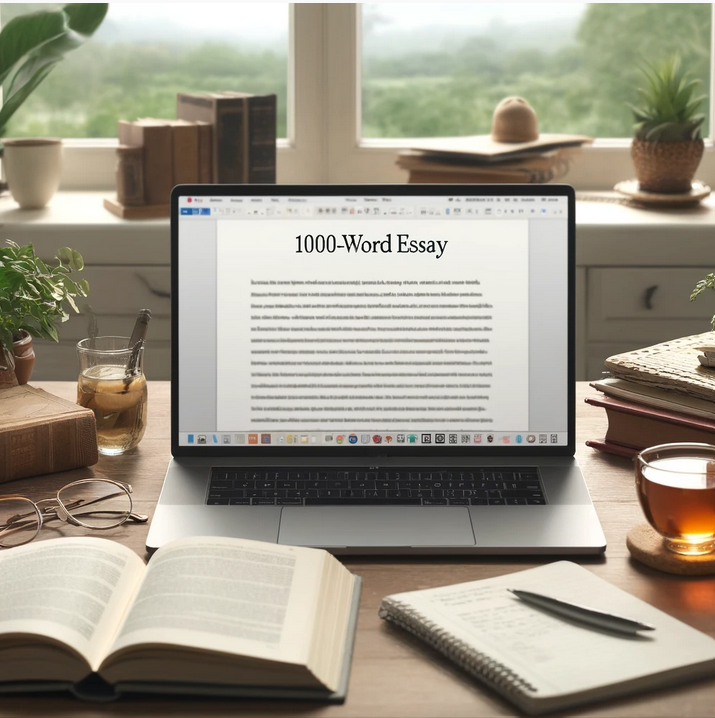Essay Writing Guides
How to Write a 1000 Word Essay


Mastering the 1000 word essay is essential for success in both academic and professional environments. This essay length is often used to assess students’ understanding and ability to argue effectively, making it a staple in many educational settings. Beyond school, the skills required to craft a concise 1000 word essay—clarity, conciseness, and coherence—are highly valued in the workplace, particularly in communications, reporting, and presentations. By learning how to structure and articulate thoughts within this format effectively, individuals can enhance their writing proficiency, which is crucial for conveying complex ideas and making persuasive arguments.
Expanding on the significance of mastering the 1000 word essay, its utility extends beyond the realms of academia and the workplace. In an era characterized by information overload and short attention spans, the ability to communicate succinctly yet persuasively is invaluable. Whether one aims to engage with a wider audience through blog posts, social media updates, or even personal correspondence, the principles of clarity, conciseness, and coherence instilled by crafting a 1000 word essay are indispensable. In an increasingly interconnected world where digital communication reigns supreme, individuals who can convey their ideas effectively in a limited space are better equipped to navigate and thrive in various spheres of life. Thus, mastering the art of the 1000 word essay not only enhances academic and professional success but also cultivates a crucial skill set for effective communication in today’s fast-paced society.
Choosing a Topic for a 1000 Word Essay
Importance of Selecting a Suitable Topic for Your 1000 word Essay
Selecting a suitable topic is crucial when writing a 1000 word essay. The topic not only sets the direction and scope of your essay but also impacts the reader’s interest and engagement. A well-chosen topic can demonstrate your knowledge and understanding of the subject and showcase your ability to think critically and creatively. It must strike a balance between being broad enough to provide sufficient material for discussion yet specific enough to be thoroughly explored within the confines of a 1000 word essay limit. A relevant and compelling topic can make the difference between an essay that is merely adequate and one that is insightful and memorable.
Tips for Brainstorming Ideas for 1000 Word Essay
Brainstorming is a vital step in the topic selection process for a 1000 word essay. Begin by jotting down any subjects or issues that interest you within the context of the assignment’s requirements. Think about current events, persistent problems in your field of study, or personal passions that connect with the broader themes of the course. Utilizing techniques like mind mapping can help you visually organize potential ideas and see how they might develop into an essay topic. Don’t hesitate to discuss your preliminary ideas with peers or instructors; feedback can often help you refine your focus or discover a new angle that you hadn’t considered.

Need a 1000 Word Essay Upgrade?
Our experts will write an essay that’s smart, sharp, and totally stress-free
How to Narrow Down to a Specific, Manageable Topic for Your 1000 Word Essay
Once you have a list of potential topics, the next step is to narrow them down to one that is manageable. Start by eliminating topics that are too broad or overly complex to be effectively addressed in a 1000 word essay. For each remaining idea, consider the amount of available research and resources. A topic with readily available sources is preferable, as it ensures you can back up your claims with evidence and examples. Finally, consider your interest and expertise in the topic. A topic that aligns with your passions or academic strengths will not only be easier and more enjoyable to write about but will likely result in a stronger, more persuasive essay. By carefully selecting and refining your topic, you set the foundation for an essay that is both informative and engaging. Below are 20 diverse topic ideas perfect for a 1000 word essay.
20 Topic Ideas Suitable for a 1000 word Essay
These topic ideas span various disciplines and interests, from technology and science to social issues and culture, providing a good mix of exploration and argumentative potential for a 1000 word essay.
- The Impact of Social Media on Modern Communication
- Climate Change: Causes and Mitigation Strategies
- The Rise of Cryptocurrency: Future of Finance or Economic Fad?
- Artificial Intelligence and Ethics: Navigating the Challenges
- The Role of Renewable Energy in Sustainable Development
- Mental Health Awareness in Schools
- The Influence of Globalization on Local Cultures
- Animal Rights and Human Responsibilities
- The Effects of Remote Learning on Student Performance
- Preventive Healthcare: Benefits Beyond Medicine
- Exploring the Gig Economy: Boon or Bane for Workers?
- Cybersecurity in the Digital Age: Safeguarding Personal Information
- The Renaissance of Space Exploration: Private Sector vs. Public Sector
- Nutrition Myths Debunked: What Science Really Says
- The Evolution of Feminism and Its Impact on Society
- Mass Media and Its Role in Shaping Public Opinion
- The Future of Jobs: The Rise of Automation and AI
- Cultural Appropriation vs. Cultural Exchange
- The Ethics of Genetic Engineering: Modifying Life
- The History and Cultural Significance of Tattoos
Types of 1000 Word Essays
Descriptive: Descriptive essays provide a detailed description of a person, place, object, or event, using sensory information to paint a vivid picture for the reader. The aim is to allow the reader to visualize and experience the subject through the writer’s eyes. In a 1000 word essay format, focus on a few key aspects to maintain depth and detail without exceeding the word limit. The use of metaphors, similes, and rich adjectives is common to enhance the reader’s sensory experience.
Argumentative: Argumentative essays assert a position on a debatable issue and support it with evidence and reasoning. The challenge in a 1000 word essay is to concisely present your argument and counterarguments without oversimplifying. This type of essay requires a clear thesis statement, reasoned arguments, and credible evidence to back up claims. The conclusion should persuasively restate the writer’s position, considering the arguments presented.
Expository: Expository essays aim to inform or explain a topic clearly and logically. This type of essay breaks down the subject into manageable parts, examining each part with facts, examples, and explanations. In a 1000 word essay, it’s crucial to choose a topic that is not too broad so that it can be thoroughly explored within the word limit. There’s no room for personal opinions—just a straightforward, objective explanation.
Narrative: Narrative essays tell a story from the writer’s perspective, often featuring personal experiences that hold some significance. The challenge with a 1000 word narrative essay is to develop a compelling story arc, complete with setting, characters, conflict, and resolution, within a concise format. The use of dialogue, descriptive details, and personal reflection helps to engage the reader and convey the essay’s deeper meaning.
Compare and Contrast: Compare and contrast essays examine the similarities and differences between two or more subjects. In a 1000 word essay, it’s effective to limit the comparison to a few key points to avoid superficiality. This type of essay helps develop critical thinking by evaluating the nuances between similar and contrasting elements. The conclusion should synthesize the findings and reflect on the broader implications or insights gained from the comparison.
How to Structure a 1000 Word Essay
Structuring a 1000 word essay involves adhering to the classic essay format, which is divided into three main parts: the introduction, the body, and the conclusion. Each segment serves a distinct purpose in the essay, contributing to a clear, coherent argument or narrative.
Introduction: This section should be concise and engaging, typically about 10% of the total word count, which is roughly 100 words for a 1000 word essay. It’s here that you introduce the topic, provide background information, and present a thesis statement that outlines the main argument or purpose of the essay. The introduction sets the tone and gives readers a clear idea of what to expect.
Body: The body is where you delve into the details of your topic or argument. For a 1000 word essay, the body will likely consist of three to four paragraphs, each one focusing on a specific point or piece of evidence that supports your thesis. Each paragraph should start with a clear topic sentence, followed by analysis, examples, and explanations. The body should make up about 80% of your essay, ensuring there is enough space to develop your ideas thoroughly.
Conclusion: The conclusion wraps up the essay by revisiting the thesis statement and summarizing the main points discussed in the body. This section should not introduce new information but should rather reflect on the implications of the findings and restate the significance of the topic. The conclusion is your final chance to impact the reader, and it should leave them with a clear understanding of your overall argument or narrative, encompassing about 10% of the essay.
By maintaining this structure, your 1000 word essay will be well-organized and logical, making it easier for the reader to follow and appreciate your ideas.
Importance of Outlining Before Writing your 1000 Word Essay
Outlining before writing is a critical step in essay composition, particularly when working with a word limit like 1000 words. An outline serves as a blueprint for your essay, organizing your thoughts and main points into a structured format. This process helps ensure that each part of your essay contributes toward the overall argument or narrative. Outlining can also prevent you from straying off-topic and assists in maintaining a logical flow from introduction to conclusion. Additionally, it allows you to allocate space for different sections, ensuring that you cover all necessary points without running out of words. Ultimately, an outline enhances the efficiency and coherence of your writing, making the drafting process smoother and faster.
1000 Word Essay Space Estimation for Each Section
Section | Description | Estimated Word Count |
Introduction | Introduces the topic and thesis statement. | 100 words |
Body | Contains three main points or paragraphs. | 800 words total |
– Point 1 | First main point. | ~266 words |
– Point 2 | Second main point. | ~266 words |
– Point 3 | Third main point. | ~266 words |
Conclusion | Summarizes and concludes the essay. | 100 words |
Estimating space for each section of a 1000 word essay is crucial to maintaining balance and depth in your writing. Typically, the introduction and conclusion should each take about 10% of the word count, which translates to approximately 100 words for each. This leaves about 800 words for the body of the essay. If your body comprises three main points or paragraphs, each would receive around 266 words. This estimation helps in keeping your arguments concise and focused, preventing any single section from dominating the essay at the expense of others. Accurately allocating space also ensures that you have sufficient room to introduce your topic, develop your thesis, and conclude effectively, thereby creating a well-rounded and compelling essay.
How to Format a 1000 Word Essay
Formatting a 1000 word essay correctly is crucial for readability and adhering to academic standards. Common formatting styles include APA, MLA, and Chicago, each with specific rules for citations, title pages, and overall layout. Here’s a brief guide on how to apply these formatting styles:
Formatting Styles: APA is often used in the social sciences and requires a title page, abstract, and references. MLA is common in humanities and features parenthetical citations and a Works Cited page. Chicago style is preferred in history and some humanities and offers two sub-styles: author-date and notes-bibliography, with specific rules for footnotes and endnotes.
Title Page, Headers, and Font Preferences: APA and Chicago styles typically require a title page, whereas MLA does not. Headers might include page numbers and the title or author’s last name, depending on the style guide. The standard font often used is Times New Roman 12 pt., but some institutions allow alternatives like Arial or Calibri 11 pt.
Paragraph and Line Spacing Guidelines: Double-spacing is standard across major styles, enhancing readability. Paragraphs should be indented, typically by 0.5 inches. Ensure margins are 1 inch on all sides, creating a clean, professional look.
Adhering to these guidelines ensures that your essay not only meets academic criteria but also presents your work in a clear, professional manner.
Tips for Editing and Productivity
Improving your editing and productivity skills is essential for efficient and effective writing for your 1000 word essay. Here are some strategies to enhance your writing process:
Strategies for Efficient Writing: Begin with a detailed outline for your 1000 word essay to streamline the writing process and minimize the time spent on restructuring content. Set specific writing goals for each session, such as a word count or completing a section, to maintain momentum and focus. Also, writing in a distraction-free environment should be considered to improve concentration and output.
Importance of Revisions and Proofreading: Revising your essay is critical for enhancing clarity, coherence, and overall quality. Allocate time after completing your draft to step away from work; returning with fresh eyes can help you spot inconsistencies and errors more effectively. Proofreading further refines your essay by catching grammatical errors, typos, and formatting issues, which are crucial for maintaining professionalism in your writing.
Using Technology Aids: Leveraging technology can significantly improve your writing quality and speed. Grammar checkers like Grammarly or the Hemingway Editor can help identify and correct errors, while style guides available online, such as Purdue OWL, provide guidelines for formatting and citations according to different academic styles. These tools help ensure that your essay adheres to the required standards and is polished and concise.
Implementing these tips can lead to more productive writing sessions and yield higher-quality essays, making the entire writing process more manageable and less daunting.
1000 Word Essay Example
This 1000 word essay explores the transformative impact of technology on education, highlighting both its benefits and challenges. It discusses how digital tools have enhanced learning experiences by accommodating diverse learning styles with multimedia content, and increased accessibility, allowing for remote learning and reducing educational costs. However, the essay also addresses significant challenges such as the digital divide, the potential degradation of basic academic skills due to over-reliance on technology, and concerns over data privacy and security. The conclusion calls for collaboration among educational stakeholders to mitigate these issues and maximize the positive impacts of technology in education.
Final Remarks
Mastering the art of writing a 1000-word essay is a valuable skill that benefits academic and professional communication. Such essays require careful planning, precise structure, and clarity in presentation, encompassing introduction, body, and conclusion sections tailored to a specific word count. Regular practice and thoughtful refinement of your essay writing abilities are essential to enhancing your proficiency in formulating coherent and compelling arguments.
For those seeking further excellence in their writing endeavors, considering services like Masters Writers’ essay writing service can be highly beneficial. Engaging with professional writers can provide insights into advanced writing techniques and help ensure your essays are not only well-written but also impactful and persuasive. Whether tackling complex topics or refining your writing style, the support from seasoned experts can be a significant advantage in your academic and professional journey.

Ready for an Essay That's More Brilliant Than Your Last Brainstorm?
Watch as our team transforms your rough ideas into a polished masterpiece that’ll wow everyone.
FAQs on 1000-Word Essays
Can I write a 1000 word essay in a day?
Yes, it’s definitely possible to write a 1000-word essay in a day. To do so effectively, start early by choosing your topic and outlining your essay. Break the task into manageable segments: 1 hour for research, 2 hours for drafting, and 1 hour for revising and editing. Keep distractions to a minimum, set specific goals for each time block, and take short breaks to maintain focus and efficiency.
How does a 1000 word essay look like?
A 1000 word essay typically consists of three main parts: an introduction, a body, and a conclusion. Visually, the essay might fill up three to four pages depending on the formatting. If using standard double-spaced lines and 12-point font with one-inch margins, it will generally take up about four pages. Each paragraph should be organized and structured logically to support the central thesis, ideally with 5 to 6 paragraphs in total including the introduction and conclusion.
Is 1000 words good for a high school essay?
Yes, 1000 words is a common and appropriate length for a high school essay. It allows students to explore a topic in sufficient depth, yet it’s concise enough to require clarity and brevity in writing. This word count helps students learn to organize their thoughts and present arguments coherently, preparing them for longer academic writing assignments in the future.
Can you write an essay in 3 hours?
Writing a 1000 word essay in 3 hours can be challenging but is achievable with good planning and some help. Start with a brief outline to organize your main points. Focus on writing a straightforward draft without worrying too much about perfection in the first go. Allocate the final hour to revise for clarity, coherence, grammar, and punctuation. Using tools like word processors with spell check can speed up the editing process. Prioritize your main arguments and be concise to meet the word count effectively.

